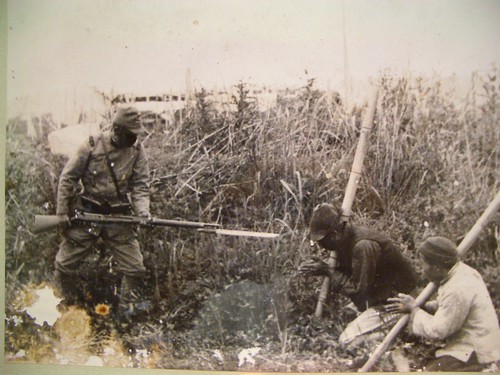Accounts from a Pure Land Buddhist priest/activist.
My friend, Jason (who helps translate), and I went for a second visit to Shingyou 真行寺 temple to meet with Takanobu Fujioka, a Jodo shinshu priest who has done his own research with the Jodo sect during WWII. He was seven years old when the war ended and recalled seeing at his elementary school field villagers being trained to stab US soldiers with the sharpened end of a bamboo pole as they floated down parachutes. His point was that everyone, civilians and soldiers alike, were fully committed to the war effort. As the government established State Shinto endorsed the emperor as the direct descendent of the gods, Japan felt fully entitled to impose its power over the rest of the world.
Under this auspices according to Fujioka san, local Jodo priests praised the war in sermons and gave their dead soldiers posthumous names that demarcated high honor and gratitude. Parishes in Kumamoto alone raised enough money to buy two airplanes and give them as donations to the Japanese air force.
This disturbing photograph was sent from one of his [father's] parishioners to the temple from China as evidence of his efforts in the war. It suggests that the soldier was responding to an endorsement the temple had given him in going to war.

A piece of information I'm still seeking out is to what extent specific temples in the prefecture were actively propagandizing the war. Unfortunately, according to Fujioka san, records of sermons from that period do not exist. As a result, there is little evidence to verify what temples were more supportive than others. I'm hoping that over the course of this year, I can collect more first-hand accounts from local priests or parishioners who lived through the war. Given that priests who questioned the war were jailed (and in a few cases executed), its little surprise that there are no accounts of war protests in Kumamoto during WWII (according to Fujioka san's findings). However, given the near obligatory support expected from temples at the time, an absence of support from any temple during that time might reflect resistance to endorse the war.
Under this auspices according to Fujioka san, local Jodo priests praised the war in sermons and gave their dead soldiers posthumous names that demarcated high honor and gratitude. Parishes in Kumamoto alone raised enough money to buy two airplanes and give them as donations to the Japanese air force.
This disturbing photograph was sent from one of his [father's] parishioners to the temple from China as evidence of his efforts in the war. It suggests that the soldier was responding to an endorsement the temple had given him in going to war.

A piece of information I'm still seeking out is to what extent specific temples in the prefecture were actively propagandizing the war. Unfortunately, according to Fujioka san, records of sermons from that period do not exist. As a result, there is little evidence to verify what temples were more supportive than others. I'm hoping that over the course of this year, I can collect more first-hand accounts from local priests or parishioners who lived through the war. Given that priests who questioned the war were jailed (and in a few cases executed), its little surprise that there are no accounts of war protests in Kumamoto during WWII (according to Fujioka san's findings). However, given the near obligatory support expected from temples at the time, an absence of support from any temple during that time might reflect resistance to endorse the war.


0 Comments:
Post a Comment
Subscribe to Post Comments [Atom]
<< Home